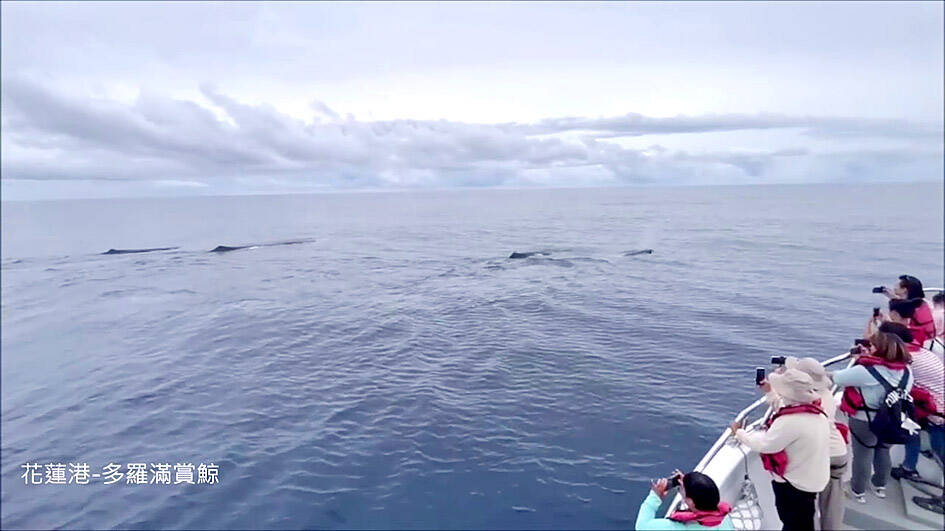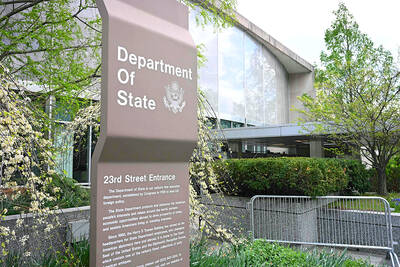The government has introduced a subsidy program for individuals visiting the east coast in an effort to promote domestic tourism with online registration starting on Saturday and running until the end of September.
Each person can receive a NT$1,000 subsidy from Monday to Thursday when staying at a government-approved hotel or private lodgings in Hualien County, and a NT$500 subsidy from Friday to Sunday.
The same subsidies would be available to those visiting Taitung County from Aug. 1.

Photo: Wang Chin-yi, Taipei Times
The program aims to stimulate the local economy and help small businesses, which were hard-hit by a series of earthquakes earlier this year, the Tourism Administration said.
Only Taiwanese are eligible, and it does not include group travel and packaged tours.
Online registration and information can be accessed at https://gostayeast.tad.gov.tw/, the agency said.
More than 700 hotels, bed-and-breakfasts and private lodgings have signed up and are eligible for the rebate program.
People can book a room directly with the hotel or lodging operators themselves, or can register on the platform set up by the agency.
If the program, which has a fixed budget, proves popular, the Tourism Administration would announce the early end of the program three weeks in advance, therefore people are advised to check the updates on the Web site.

Hong Kong singer Eason Chan’s (陳奕迅) concerts in Kaohsiung this weekend have been postponed after he was diagnosed with Covid-19 this morning, the organizer said today. Chan’s “FEAR and DREAMS” concert which was scheduled to be held in the coming three days at the Kaohsiung Arena would be rescheduled to May 29, 30 and 31, while the three shows scheduled over the next weekend, from May 23 to 25, would be held as usual, Universal Music said in a statement. Ticket holders can apply for a full refund or attend the postponed concerts with the same seating, the organizer said. Refund arrangements would

Former president Tsai Ing-wen (蔡英文) on Monday called for greater cooperation between Taiwan, Lithuania and the EU to counter threats to information security, including attacks on undersea cables and other critical infrastructure. In a speech at Vilnius University in the Lithuanian capital, Tsai highlighted recent incidents in which vital undersea cables — essential for cross-border data transmission — were severed in the Taiwan Strait and the Baltic Sea over the past year. Taiwanese authorities suspect Chinese sabotage in the incidents near Taiwan’s waters, while EU leaders have said Russia is the likely culprit behind similar breaches in the Baltic. “Taiwan and our European

Taiwanese indie band Sunset Rollercoaster and South Korean outfit Hyukoh collectively received the most nominations at this year’s Golden Melody Awards, earning a total of seven nods from the jury on Wednesday. The bands collaborated on their 2024 album AAA, which received nominations for best band, best album producer, best album design and best vocal album recording. “Young Man,” a single from the album, earned nominations for song of the year and best music video, while another track, “Antenna,” also received a best music video nomination. Late Hong Kong-American singer Khalil Fong (方大同) was named the jury award winner for his 2024 album

The US Department of State on Monday reaffirmed that US policy on Taiwan remains unchanged, following US President Donald Trump’s use of the term “unification” while commenting on recent trade talks with China. Speaking at a wide-ranging press conference, Trump described what he viewed as progress in trade negotiations with China held in Geneva, Switzerland, over the weekend. “They’ve agreed to open China — fully open China, and I think it’s going to be fantastic for China. I think it’s going to be fantastic for us,” Trump said. “I think it’s going to be great for unification and peace.” Trump’s use of the